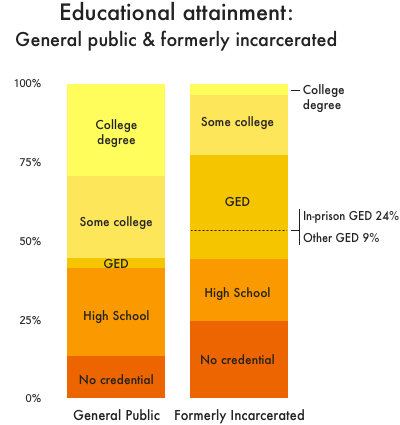Hi, I’m Lexi, and I went to juvie once for hot-wiring and stealing a car. What about you? Yeah, this is probably not how you’re introducing yourself to your classmates. I’m sure that the criminal record of the people sitting next to you in class is not something that comes to mind at all. But why? There is controversy whether or not people with criminal backgrounds should have equal opportunities for higher education. I noticed during my college application process that they all asked about my criminal record. It was straightforward, do you or do you not have a criminal record. For many of us, this is a quick click. For others, it is a long, tedious process.
To best determine whether or not the door to education should be held open to criminals, it’s a good idea to first look at why people go to prison in the first place. A survey by Psychology Today found that the top three reasons for imprisonment are:
(1) Punishment
(2) Making the world safer for others
(3) Rehabilitation
I would say that all of these options are valid. Of course, some crimes are more severe than others, and the reason for each sentence varies. I would say that the consensus is that people who go to prison are bad. I mean, this is a safe assumption. Breaking the law is bad. Robbery is bad. Murder is bad. Rape is bad. It is difficult to say otherwise. No law states that ex-felons can’t get a degree, so why do colleges ask about criminal records?
Having a criminal background makes it harder to get into college, but that doesn’t eliminate your chances. The top offenses that colleges look for are violent pasts and sexual offenses. This is for the safety of the student body.

Percentages of ex-felon acceptances depending on whether criminal history is questioned
Back in 2015, former president Barack Obama embraced an initiative called Ban the Box. The idea was to remove any criminal background questions from college and job applications. The simple question often formed a barrier for many ex-felons trying to return to regular life. The initiative, while promising, did not go very far. However, in the past year, the act has resurfaced as the Beyond the Box for Higher Education Act of 2021. The goal of this bill is to guide and recommend institutions to remove any criminal and juvenile justice questions from their application process. Programs such as the Pell Grant, a fund for prisoners to get higher education, are becoming more and more prevalent, which has been good for the criminal community. These programs allow people in prison or juvie to sample education. This urges them to seek education after they are released.

Approximately 72 percent of colleges and universities inquire about the criminal background as a part of their application process. A report by the Institute for Higher Education Policy stated that violent or sex offense convicts are more likely than not denied admission to schools. However other offenses are still considered for admission. The Beyond the Box Act encourages removing criminal history questions on applications, but still allows the questions after acceptance. This reduces the anxiety students may have from the question, yet still provide the necessary precautions for admitting students that will do well in the environment. College is stressful as it is, there is no need to keep piling it on.
I find this topic very interesting and difficult to pick a side. Part of me wants to say that everyone deserves a second chance and an education, especially if they have served their time and have earned their freedom. The other part of me understands the risk of accepting students who have a record because there is no promise that they have changed. At the end of the day, a criminal record doesn’t define who you are. I don’t think that past mistakes should hinder you from moving forward. I believe in glancing back, but never fully turning around.